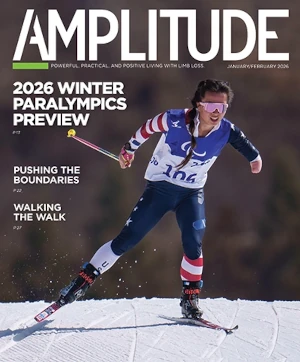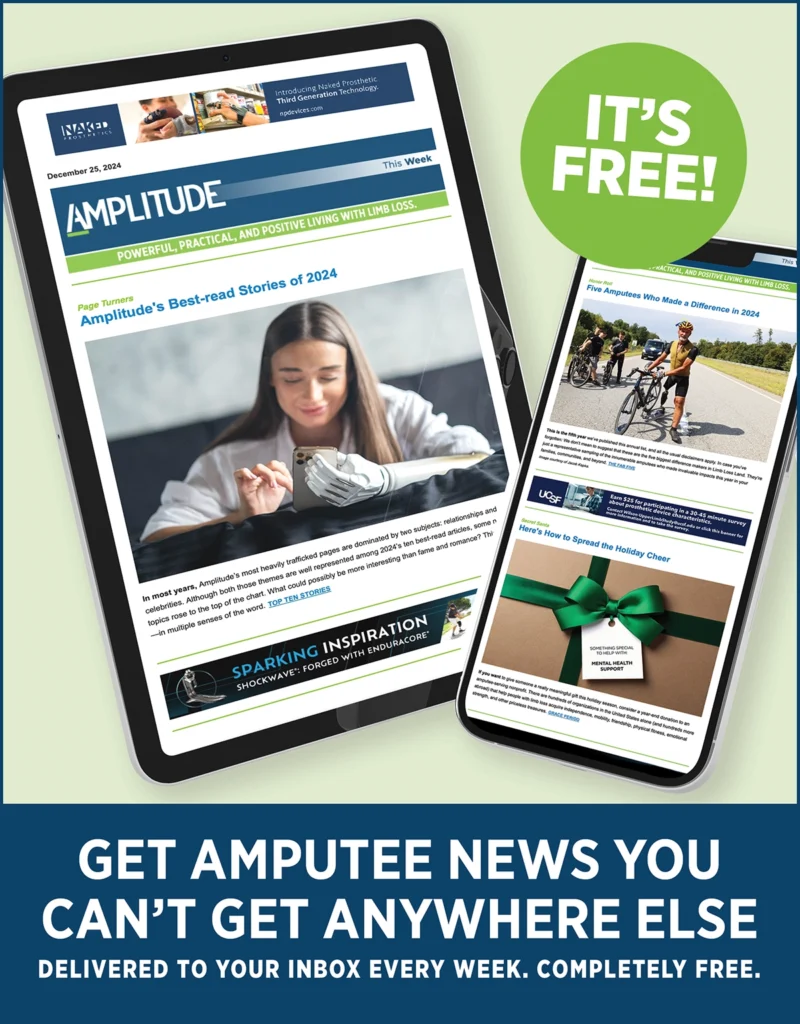
Don’t it always seem to go
That you don’t know what you’ve got til it’s gone?
—Joni Mitchell
If it seems like everyone’ s freaking out about the elimination of funding for the National Limb Loss Resource Center (NLLRC) . . . . well, we are. The NLLRC is one of the limb-loss community’s most impactful institutions, a foundation for everything from peer visitation to amputee support groups, youth programs, caregiver services, employment guidance, and educational outreach. Congress has been funding the NLLRC for so long (almost 30 years), it sometimes gets taken for granted. But the White House has asked Congress to get rid of it. And unless Congress hears from, and listens to, the strong majority of Americans who support the NLLRC . . . . poof.
So, with apologies to Joni, know what you’ve got in the NLLRC before it’s gone. And do everything you can to preserve it. The Amputee Coalition has a list of specific actions you can take to persuade your representatives to include NLLRC funding in next year’s budget. Don’t mess around—follow the link and make your voice heard today. Get your friends and family to speak up, too.
Lawmakers from both parties overwhelmingly support the NLLRC, but many are under pressure to put politics above their constituents’ interests. Let them know you are counting on their leadership—and you are paying attention to their actions. The 17 members of the House Appropriations subcommittee on Labor, Health, and Human Services (see list below) definitely need to hear our voices. Those 17 legislators will mark up the relevant part of the budget before it reaches the House floor; if they restore funding for the NLLRC, its chances of survival greatly increase.
Here’s another glimmer of hope: The White House asked Congress to defund the NLLRC once before, in 2017. In that instance, federal lawmakers—knowing the NLLRC fills a vital need in the communities they represent—politely declined the White House’s request and funded the NLLRC anyway, with bipartisan support. It will be more difficult for them to make the same choice this time, in an era of manic budget cutting. Amputee Nation will need to rally more forcefully.
This is an all-hands-on-deck, last-stand situation. If we lose the NLLRC now, it’s probably never coming back—and the amputee community will lose decades’ worth of hard-won progress.
What Does the NLLRC Do for Amputees?
As a new amputee in early 2021, Steph Elliott set a hard boundary while educating herself about limb loss. “I was not going to go down the rabbit hole of Googling things randomly and getting bad information,” says Elliott, an early childhood educator from Bucks County, PA. “I’m a very cautious person. I want to know I’m getting information that’s accurate, vetted, and relevant to my case.”
Like many thousands of amputees before and since, Elliott found what she needed at the NLLRC. She and her husband referred to it for guidance on insurance claims, mobility aids, caregiving, and other common new-amputee issues. She routinely goes back to it as new needs arise. “Things are always going to crop up in this journey,” she says. “It’s very reassuring to have a place where you can get reliable, factual, documented information. You can even reach out on the phone and say, ‘Hey, this is what I’m up against,’ and somebody’s got a direction they can send you in.”
Jenny Yonce turned to the NLLRC two years ago when her then-10-year-old son, Gavin, was diagnosed with Ewing’s sarcoma. “His doctors presented us with the option to do limb salvage, full amputation, or rotationplasty,” says Yonce, an educator in northern Virginia. “It turned our lives upside down, and we were looking for any resource that would allow us to help him make an educated decision about his body. We just didn’t know what was the best option for him, and the Resource Center helped us to do that research.”
Based on information they found at the NLLRC, the Yonces decided rotationplasty would best support their son’s desire to continue playing sports. They also discovered other resources—including peer mentoring, youth camps, sports programs, and mental health services—that enabled them to map out future steps in the journey.
“Just knowing those resources are out there for him, should he need them, is invaluable,” Yonce says. “He can see his future and know he’s going to be able to live his life and be happy. He can see all the things that will help him reach his potential. It boggles my mind that this resource could be taken away from families.”
“I’ll never forget those moments when we were making that decision,” she adds. “Ultimately, those resources [from the NLLRC] gave us concrete reassurances of what his future could look like, and what steps we needed to take to help him get there. He felt more confident because we were confident.”
Action Plan to Preserve Funding for the NLLRC
The federal funding wars are exhausting. In addition to targeting the NLLRC, DC budget shredders are trying to shrink Medicaid. They’re going after programs that support amputee-related medical research and education. They’re coming for food stamps, education grants, public transportation, national parks, and a million other things that matter to amputees.
All those battles merit your attention, too. But the NLLRC fight is a direct assault on one of the only federal funding streams specifically earmarked for people with limb loss. It’s a winnable fight, over a pot of money (millions, not billions) that our country can easily afford. And it only takes a few minutes to pull your weight, using the tools at the Amputee Coalition’s “Funding Updates” page.
The Congressional members listed below have extra leverage to affect the outcome. These are the members of the House Appropriations subcommittee that will mark up the section of the budget that includes the NLLRC. Their official deliberations won’t begin for a few weeks. Whether or not you live in one of these districts—but especially if you do—let them hear from you and everyone who cares about you.
Alabama 4th: Robert Aderholt (Chair)
California 9th: Josh Harder
Connecticut 3rd: Rosa DeLauro
Georgia 9th: Andrew Clyde
Idaho 2nd: Mike Simpson
Louisiana 5th: Julia Letlow
Maryland 1st: Andy Harris
Maryland 5th: Steny Hoyer
Michigan 2nd: John Moolenaar
New Jersey 12th: Bonnie Watson Coleman
Oklahoma 5th: Stephanie Bice
Pennsylvania 4th: Madeleine Dean
Tennessee 3rd: Chuck Fleischmann
Texas 6th: Jake Ellzey
West Virginia 2nd: Riley Moore
Wisconsin 2nd: Mark Pocan





